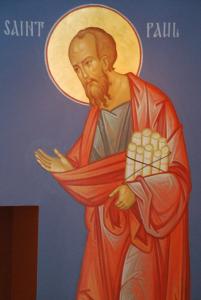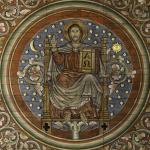
When we have faith in someone or something, we place our trust in that person or thing. We can have faith, that is, trust in someone or something for many different reasons. Sometimes, our reasons can be good, demonstrating how faith and reason can work together and complement each other, but sometimes, our reasons can be unsound, but when they are faulty, that doesn’t necessarily mean our trust is misplaced. We can be right for the wrong reasons. Or, we could have good reasons to hold to some faith, and yet still be wrong, because we place our trust in the wrong person or thing. However we reason out our faith, it would seem that there is something more to our faith than what we can establish with reason alone. At best, the rationale we give should serve as a good indication as to why we believe as we do, but it can only show so much; there is much which lies beyond the rationale, that is, our faith, indeed all faith, seems to contain elements which transcend reason. That is, there tends to be deeper, something greater, something far more conclusive (to us) which leads us to have our faith than what can be demonstrated by reason alone. When we lose that connection, then, no matter what intellectual reasons we give for our faith, we find our faith itself is lost, while, on the other hand, if it is there, our faith will remain even if we cannot use reason to prove it. Faith and reason can go together, and a good faith will allow reason to work with it, but all faith transcends such reasoning, whether we acknowledge it or not. There must always be something which reason uses, a given, which reason cannot provide by itself.
Christianity is faith in Jesus, leading to complete trust in what he said and did. Christians believe the truth which was revealed through him. To understand it, however, requires us to engage it with our intellect, and in doing so, we must embrace reason and use it to help us come to our conclusions. However, we must make sure that we do not lean too much on our own understanding, on our own reason. We must recognized the limited nature of our intellect, and so the limited nature of our reason. We are to use it to make systematic representations of our faith, but when we do so, we must realize it is only a representation of it, a construct which we made, and treat it as such. That is, we must make sure we do not do is transfer our faith in Jesus and in revelation to the systematic explanation which we provide to explain that faith, for when we do that, we turn away from the greater, transcendent truth of revelation and instead become trapped by our own thoughts and understandings.
Paul, therefore, expressed the reality of faith in words and ideas which connected to his own particular context. He knew what he was doing. He understood the limitations of the analogies he used to present that faith. He even warned us that we should be cautious, telling us that when we read what he wrote, we should not get caught up in the letter, but rather, we should see what it was he was intending us to learn, and embrace that and not the words themselves. This is especially important for us to understand so that when we read him talking about how we have been set free from sin in order to become slaves to righteousness. He said he was trying to explain something which could not be easily stated and that he had to use conventions which his original audience, the people living in his time, could understood:
But thanks be to God, that you who were once slaves of sin have become obedient from the heart to the standard of teaching to which you were committed, and, having been set free from sin, have become slaves of righteousness. I am speaking in human terms, because of your natural limitations. For just as you once yielded your members to impurity and to greater and greater iniquity, so now yield your members to righteousness for sanctification. When you were slaves of sin, you were free in regard to righteousness. But then what return did you get from the things of which you are now ashamed? The end of those things is death. But now that you have been set free from sin and have become slaves of God, the return you get is sanctification and its end, eternal life. For the wages of sin is death, but the free gift of God is eternal life in Christ Jesus our Lord (Rom. 6:18-23 RSV).
These words can be easily misinterpreted. If we don’t take Paul seriously when he said he was using human terms to express truths which transcend the terms, we can easily turn his words against their original meaning, and use words which were meant to suggest the freedom we have gained in Christ as words to enslave us with legalistic ideologies. For, on one level, it would seem Paul said we are all slaves, and all that matters is we make sure we end up being a slave to God instead of sin. It is easy to see how this could, and would, be used by many who wanted to suggest Scripture has no problems with slavery, because God himself has us as slaves. This was not Paul’s intent. Paul was using slavery, an institution which was accepted at his time, as an analogy, with one specific point he wanted to make with it. As with all analogies, there were and are elements between the analogues which do not exactly fit, and in this case, the analogy is close to breaking at its seems, because, in reality, one who is set free from slavery will no longer be a slave. So how could Paul talk about someone being set free from slavery to sin and yet call them a slave to God? It’s because the only true slavery is found in sin; sin leads to bondage, the diminishment of human freedom, and death. God, however, gives freedom, life, power, greatness, and so to be with God is to be set free from the oppression of sin. Once set free, God wants us to freely do what is good and true. God wants our trust, our faith, and in that faith, but more than that, God wants our love. What has been revealed to us in Jesus is God is love, and so to trust in God is to trust in love. We are to love and be loved, and in that love, find our true freedom. God desires us to be holy, and we, out of our love, will desire to be holy as well, and the more we find ourselves freed from the bondage of sin, the more we will desire such holiness, and thanks to God’s grace, we will find ourselves attaining it. We will be holy, and that holiness will reveal itself in all that we say and do; it will be as if we are directed by its dictates, though in reality, we will be free, and we will do what is good and true because it will be what we want to do, not because we feel it is a necessity. But to others, it might seem we are the ones who are enslaved, as we do not do the things they want to do, the things their bondage to sin encourages them to do. Our trust in God, and God’s love, however, makes us see beyond such apparent slavery, even if we cannot explain or prove to others the freedom God’s love and grace has given to us. Because such liberation comes to us from God’s love, we must never confuse our relationship with God with human slavery, and so use Paul’s analogy, which he understood was imperfect, to serve as justification for any kind of human slavery. For, it must be made clear, the human institution of slavery is not founded upon such benevolence. It is always oppressive.
Having faith in God does not mean we will ignore our use of reason. Far from it. We are expected to use it, but we always remember how limited our intellect really us, realizing, therefore, what can be presented by reason is also limited. Our faith must transcend the words we use to explain it. The Christian faith is faith in Jesus Christ, and through that faith, all that Jesus has revealed to us. We trust Jesus, if, for no other reason, than Jesus has shown himself faithful to us. What he asks from us he also gives. And what he asks is love. His fidelity and love towards us reveals God’s fidelity and love towards us, and that faithfulness, shown especially in the death and resurrection of Jesus, is what gives rise to our faith, love, and devotion. In the end, we are not expected to be servants, or slaves to God, but lovers, and though we can then describe ourselves bound to God by love. we must realize that even such a word, such a description, falters at what is really happening in and with our faith. We must focus more on what Jesus told us and trust him completely when he said we are not to think of ourselves as slaves, but as friends and heirs of the kingdom of God (cf. Jn. 15:15).
Stay in touch! Like A Little Bit of Nothing on Facebook.
If you liked what you read, please consider sharing it with your friends and family!













